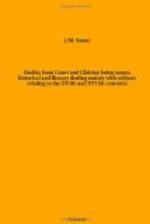“The Puritans have always been, and ever will be, intent on upsetting all kingly authority. Such is the rebellious spirit of their Calvinism, that it aims at nothing less than the total destruction of the King and of the Catholic religion.
“I then spoke of the greatness which would accrue to England if the King’s conversion were brought about, dwelling not only on the advantageous relationships he might form, in disposing of the Prince and Princess in marriage, but also on the disputes perpetually taking place between France and Spain, in which his Majesty would be the recognised arbitrator and peacemaker. Neither country would have the temerity to offend him, on account of the power he would possess to harm them, having the supreme Pontiff on his side.”
Rosetti here proceeds to define, somewhat lengthily, the exact position of a Catholic King of England in European politics, and the kind of prestige he would acquire if he embraced a religion to which he was already partially inclined. Then, speaking of the King more personally, he went on:—
“If, having considered all these things, his Majesty comes to a decided resolution, he should not delay putting it into effect from fear of the consequences. Henry VIII. risked more in his unholy determination to destroy the Catholic religion, which had flourished in this country with such pious results for so many centuries. I insisted that it was time his Majesty made an end of his ambiguousness and hesitation, and that he should once for all fix his mind, there being nothing more injurious than leisurely deliberation when a man has need of prompt decision and action. I told Mr. Windebank further, that the King’s procrastination was simply putting the sceptre into the hands of the Puritans, was ruining the State, his children, and himself, and that a really wise prince not only provides for the safety of his kingdom during his own life-time, but orders things in such a manner that at his death he secures his inheritance to his posterity.
“His Majesty, I declared, could take no step more just and more pleasing to God than by restoring to this country its ancient religion, professed by his ancestors, and I believed that this King, so good, so just, and so virtuous in many ways, was appointed by divine Providence for the great work.
“The King was, I said, already armed; help might confidently be expected to flow in from Ireland, through the devotion and loyalty of that people, and his Holiness would moreover assist him with men and money.
“Finally, I showed the necessity of this union, for the salvation of souls, a point which I ought to have begun with, it being certain that none can be saved out of the bosom of the Catholic Church. Of this the Nicaean Council speaks in the great creed, in unam sanctam Catholicam Ecclesiam et Apostolicam, in which Protestants believe as we do, and yet it is not said that there are two or more churches.




